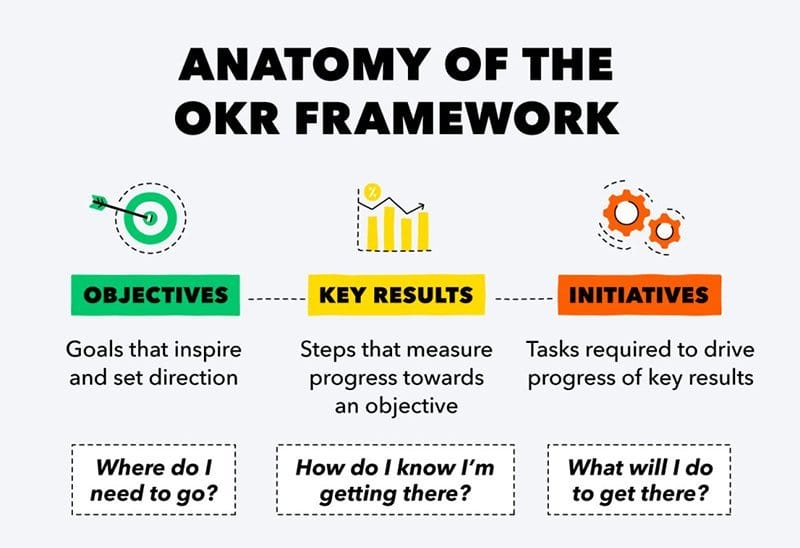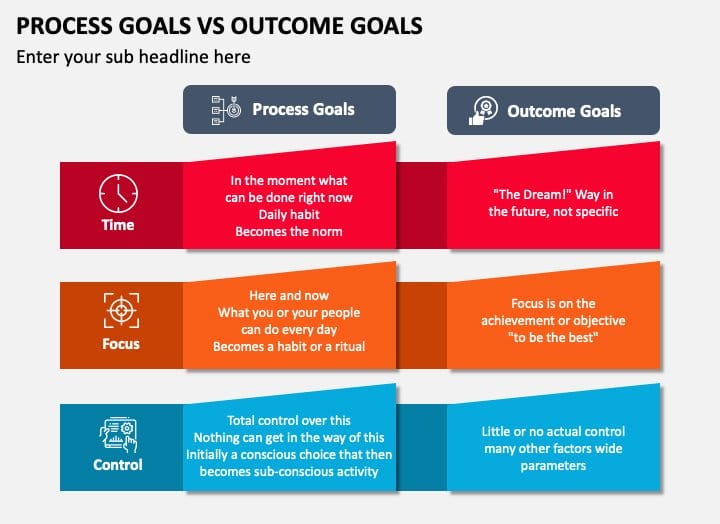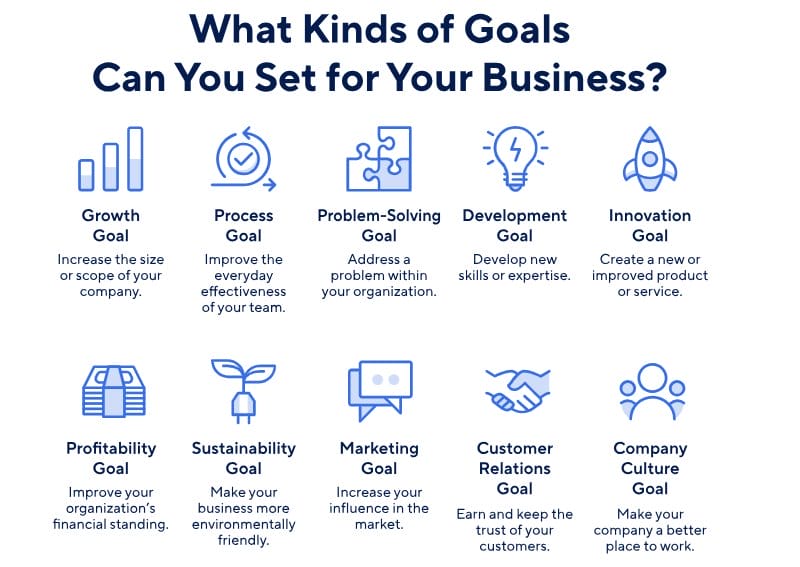16 Different Types of Goals You Can Pursue (With Examples)
Setting goals, whether business or personal development goals, helps you stay focused and accomplish your milestones. However, goal-setting statistics suggest that 92% of people do not achieve their goals. Why?
There is a big difference between setting smart goals that work and vague goals that are difficult to accomplish. If you want to join the 8% of people who achieve their goals, set specific, measurable, achievable, realistic, and time-bound goals.
This article explores the 16 different goal categories you can use to challenge yourself personally and professionally to enjoy a more fulfilling life.
What Are Goals?
Goals are concrete plans characterized by specific actions tied to a positive outcome. Irrespective of how small or large a goal is, dedication, resilience, and sustained effort are key attributes that guarantee a favorable outcome.
Unlike other specific actions, goals are time-bound. Goals have specific time frames attached to them that guide the outcome.
Goals require concrete effort. You have to create a specific plan on how to achieve the determined goal.
While setting goals is a process, and like all processes, it can be overwhelming, setting goals can be motivating, offering unique learning opportunities.
There are different goal-setting frameworks you can use to set successful and sustainable goals but the most popular ones are the SMART goals framework and OKRs framework.
SMART Goals Framework
The SMART Goals framework is one of the most popular goal-setting frameworks that provides an easy and smarter way to set and accomplish goals.
SMART is an acronym for Specific, Measurable, Achievable, Realistic, and Timely. Setting SMART goals involves asking questions like:
- What specific goal do you want to set?
- How can you measure the goal?
- Is the goal achievable?
- How realistic is the goal?
- Is there a timeframe to achieve the goal?

OKRs Framework
OKRs (Objectives and Key Results) is a goal-setting framework used by businesses like Google, Twitter, and LinkedIn to set objectives and track and measure progress.

Types of Goals Based on Results
You can categorize goals based on results, with hard work and sustained effort at the forefront of goal setting. While results vary based on the type of goal set, you can spot results-driven goals by the emphasis laid on the experience of achieving them.
Here are some of the types of goals based on results:
1. Performance Goals
Just like in plain terms, performance goals are short-term goals. These goals are characterized by an outcome tied to unique performing factors. They are also common goals tied to our day-to-day activities as humans.
Every performance goal is linked to specific setting stones, as they ensure they are measurable and paced as outcome goals.
The unique thing about performance goals is they are linked together. To a large extent, larger goals are dependent on smaller goals. With your goals linked together, you can develop new skills needed to improve performance and accomplish your set goals.
Examples of Performance Goals
- Coming up first in a professional examination.
- Reaching your yearly sales target.
- Improving your professional skills in your career.
2. Learning Goals
Learning goals are based on developing new skills and abilities, specifically tied to your personal development. They serve as a plus to a person’s career, opening up new opportunities that help you build a promising future.
These goals help boost your career development, helping you easily navigate through challenges in your career.
The ultimate result attached to learning goals is how it spurs you to keep moving forward, increasing your productivity and ultimately guaranteeing a meaningful life.
Examples of Learning Goals
- Thinking positively to stay focused.
- Improving reading comprehension.
- Developing communication skills.
3. Process Goals
Process goals are the small and measurable steps we take to achieve a larger goal. Unlike other types of goals based on results, process goals focus more on the process of achieving the result, rather than the result.
These goals put you in total control of the process, giving you control over the areas you focus your time and effort.
The gray area in setting process goals is that, sometimes, it takes the focus away from the results, with the primary focus on the process. Process goals can reduce your drive towards the results.

Examples of Process Goals
- Writing a to-do list every day.
- Working 20 hours of overtime every week.
- Applying for new job opportunities every week.
4. Quantitative Goals vs Qualitative Goals
Quantitative goals are specific goals that depend solely on the direct action taken. They are objective, center around measurable units represented by numbers or raw data, and easily determined by analytics.
On the other hand, qualitative goals are subjective, depending on the ultimate results rather than specific actions taken. These goals are complex and largely immeasurable on their own but are important in how they provide insight into other areas.
The major difference between these two types of goals is while quantitative goals are measurable, qualitative goals are complex and difficult to measure.
Examples of Qualitative and Quantitative Goals
| Qualitative Goals | Qualitative Goals |
|---|---|
| Boosting sales by 5% monthly. | Implementing employee ownership in the business over the next five years. |
| Increasing revenue by $50,000 over three months. | Improving the company’s culture to improve employee engagement. |
Types of Goals Based on Time
Time is a huge determining factor in goal setting. Different goals depend on different time frames for their completion. The time frame attached to each goal relies on how demanding the efforts are to complete the set goals.
While time is a fixed invariable constant, goals, on the other hand, are subject to change if the need arises. Flexibility has a huge role in goal setting, allowing for adjustments to goals around a scheduled time frame.
1. Lifetime Goals
Lifetime goals have the longest period attached to them. They span the entirety of a person’s life. Unlike other goals based on time, lifetime goals are not immediate and require sustained effort to bring them into reality.
These goals are closely linked to personal development and require you to look beyond your present to foresee a better future for yourself.
Your lifetime goals must align with your values and reflect who you are and what you want to become.
Examples of Lifetime Goals
- Earning a steady passive income.
- Traveling the world.
- Balancing work with life.
2. Short-term Goals
Compared to lifetime goals, short-term goals offer a short and limited time to completion. Despite being short-term, these goals still require ample time and effort for successful completion.
You can pace your short-term goals hourly, daily, weekly, monthly, or yearly, so long they are attainable within the set time frame.
Examples of Short-Term Goals
- Paying back a loan monthly for a year.
- Cultivating new habits monthly.
- Saving money daily for a month.
3. Long-term Goals
Long-term goals are slightly similar to lifetime goals in their time range but are more specific to a measurable time frame.
Just like a short-term goal and a lifetime goal, every long-term goal requires a significant amount of hard work and dedication.
The only way you can distinguish a long-term goal from a lifetime goal is to set a time limit that you can use to hold yourself accountable.

Examples of Long-term Goals
- Obtaining another degree.
- Saving for retirement.
- Changing your career.
Types of Goals Based on Areas of Your Life
Across various areas of a person's life, goal setting is paramount. Setting goals provides the needed structure to point you in the right direction.
Every aspect of your life needs to be defined, and that is where setting goals is effective. Setting goals helps to checkmate your decisions and ensure you are on the right track.
Keeping your goals smart is one of the ways that guarantee a fulfilled life. Whether relationship goals, family goals, intellectual goals, or foundational goals, life goals help shape you and keep you moving in a positive direction.
1. Financial Goals
Financial planning is an important part of a person’s life and is tied to your success story as an individual or organization. While money is the world’s universal currency, proper management goes a long way in ensuring it spans across time.
Financial goals are either long-term or short-term goals that build a sustainable plan for the judicious management of your finances.

Setting financial goals helps guarantee a stable future financially, putting you on the right track to achieve your major goals.
Examples of Financial Goals
- Building an emergency fund.
- Retirement planning.
- Saving for college.
2. Career Goals
Career goals are forward-thinking goals that evaluate your present position and forecast plans for your future. With your career goals in place, it is easier to know where you are and the kind of jobs that will guarantee a fulfilling life.
The good thing about career goals is that they are stepping stones. Your present job is a stepping stone that propels you to find your dream job. Career goals are easily achievable with concrete actions.
Examples of Career Goals
- Expanding your professional network.
- Starting your own business.
- Building a personal website.
3. Academic Goals
Academic goals guide your educational performance and apply to formal and informal forms of education. As much as learning is a continuous and daily process, having a structured plan for your learning helps keep you accountable.
These goals are referred to as educational goals and involve gaining new knowledge and expanding your already-acquired knowledge base.
Whether through earning a new college degree, or learning a new skill, academic goals are designed to build you personally and professionally.
Examples of Academic Goals
- Developing better research skills.
- Improving reading comprehension.
- Getting admitted into medical school.
4. Physical Goals
Physical goals shape your physical well-being, focusing on ensuring optimal physical and mental health status. As minute as physical health goals are, they are the backbone of other set goals, as they indirectly affect your ability to accomplish them.
These goals are directly tied to your health and help you maintain your current health and improve your life span.
Fitness goals are another area that falls under physical goals and is directly tied to your health status. Setting up fitness goals for yourself helps you maintain a healthy lifestyle and guarantees an improvement in your well-being and longevity.
Examples of Physical Goals
- Boosting your cardio endurance.
- Taking time for daily relaxation and recreation.
- Eating whole foods.
5. Spiritual Goals
Spiritual goals keep your focus on a deity, helping you build and improve your personal relationship and connection with the deity. Spirituality is a very dicey topic that often riles people up but has proven to help with stress and anxiety.
Building a spiritual connection is the basis of all other life goals, helping you determine what is justifiably right and wrong. Your spiritual goals help shape your moral compass and are an intermediary between what and how you want your life to play out.
Spiritual goals help you build your connection with others around you, providing you with a sense of guidance and fellowship. By having a well-detailed spiritual goal for yourself, you stay true to your values and hold yourself accountable for your life decisions.
Examples of Spiritual Goals
- Keeping a spiritual journal.
- Conversing with deity regularly.
- Going to a place of worship for personal fellowship.
6. Interpersonal Goals
Interpersonal goals help shape how you relate personally with people around you. They fall into the category of personal goals. These goals focus primarily on your social skills and how you build meaningful relationships with others.
Relationships vary depending on your closeness with the people around you and interpersonal goals should reflect on your relationships. You can set interpersonal goals for your relationships with family members, acquaintances, friends, or professional connections.
Your ability to distinguish between your social status and relationship is crucial in setting goals between people. Often, these goals serve as boundaries that govern how you relate with every person within your circle.
Examples of Interpersonal Goals
- Improving your leadership skills.
- Becoming a more confident communicator.
- Improving your active listening skills.
7. Stretch Goals
Stretch goals push you to your limit, intending to bring out the best version of yourself. Unlike other types of goals, these goals require significant effort and risk to achieve, making them harder to accomplish.
Setting stretch goals is to take you from your normal convenient spot and push you to take on greater risks. Stretch goals differ considerably from your regular routine or scope of operation.
The primary benefit you get from stretch goals is how they encourage you to push beyond, taking up larger risks for maximum reward.
Taking up these goals expands your ability as a person, opening you up to new areas that were previously beyond your scope of operation.
Examples of Stretch Goals
- Pursuing another job.
- Learning a new language.
- Finishing an almost impossible task.
8. Business Goals
Business goals are specific to a business, company, or organization, and designed to position the establishment to make more money. Unlike financial goals that cover individuals and organizations, business goals are specific to a particular business enterprise.
The primary aim of setting up a business is to make a profit, and business goals aim to provide proactive ways of achieving such set goals. Most companies set up business goals to monitor their money situation or find immediate ways to improve their financial situation.
Business goals focus on the business aspect, finding creative ways to ensure the company is getting a return for its goods and services. They can serve as a means of improving the work environment, making it more favorable for employees.

Examples of Business Goals
- Increasing profits by 20% in the 3rd quarter.
- Expanding the company’s market share by 5%.
- Driving more sales.
9. Intellectual Goals
Intellectual goals focus on improving your knowledge, skills, and cognitive abilities. They are specific goals based on how you want to develop and put your intellectual gift to good use.
These goals are closely linked to your life goals, helping you to prioritize your personal growth. The idea of intellectual goals is born out of the desire of humans to want more. Setting intellectual goals helps guarantee the continuous learning process.
Examples of Intellectual Goals
- Learning to speed-read.
- Finding new and stimulating conversation partners.
Explore Further
- Best Goals Quotes
- Goal Setting and Tracking Templates
- Goals, Objectives, Strategies, and Tactics
- How to Write an Action Plan
- Best Business Objectives To Consider
- Project Planning Quotes
- Tips for Managing Time Effectively